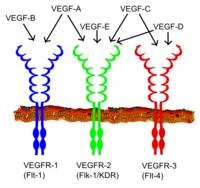
Photo from wikipedia
Pancreatic cancer remains one of the most lethal malignant cancers because the symptoms of this cancer do not exhibit until the disease progresses to an advanced stage. Late diagnosis may… Click to show full abstract
Pancreatic cancer remains one of the most lethal malignant cancers because the symptoms of this cancer do not exhibit until the disease progresses to an advanced stage. Late diagnosis may result in metastasis. When metastasis occurs, cancer can no longer be removed with surgery and therefore, requires treatment with FDA approved chemotherapeutic drugs or radiotherapy and they often fail to treat the disease. KB-S is a synthetic thymidine nucleoside analogue which is broadly used for the treatment of Human Immunodeficiency Virus (HIV). In this work, we explored the therapeutic potential of KB-S as an anticancer drug, with focused against pancreatic cancer. Our aim is to establish a connection between cellular kinase of KB-S and atypical protein kinase C (aPKC) to decipher signaling pathways. Pancreatic adenocarcinoma, ASPC-1 cell line was used for the study. Hemocytometer was used for cell counting for the dose response curve after treating with KB-S. Immunoprecipitation study was conducted using anti-PKC-iota beads. Western blot assay was performed using primary antibody PKC-zeta and a secondary antibody. Our results showed that KB-S decreases cell proliferation significantly on AsPC-1 cells over increasing the concentrations. KB-S decreased the proliferation by 20% for 0.5 µM (P≤ 0.09), 37% for 5 µM (P≤ 0.02), 44% for 10 µM (P≤ 0.01), 48% for 20 µM (P≤ 0.002) and 54% for 50 µM (P≤ 0.001) in AsPC-1 cells. We used the lowest concentration of 10 µM with significant inhibition for further experiments. We immunoprecipitated for PKC-ι and immunoblotted for PKC-ζ and the immunoblots showed that there is no association between PKC-ι and PKC-ζ in pancreatic cancer cell line (AsPC-1). But when we performed reverse immunoprecipitation, we found that there is an association between PKC-ι and PKC-ζ. Again, we immunoprecipitated for thymidine kinase and immunoblotted for PKC-ι and immunoblots showed that there is an association between thymidine kinase and PKC-ι. But when we did the reverse immunoprecipitation, we did not find any association between thymidine kinase and PKC-ι in pancreatic cancer cell line. Based on our preliminary studies, we report the anti-cancer effect of KB-S in treating a pancreatic cancer cell line leading to further future investigations. To the best of our knowledge, this is the first demonstration of therapeutic efficacy of KB-S against a cancer. Given that, KB-S is already approved by FDA for the treatment of HIV, it carries the potential to be repurposed for difficult to cure cancerous diseases such as pancreatic cancer. Citation Format: Sadia Noosrat Boshra, Kirpal Bisht, Mildred Acevedo-Duncan. The role of KB-S in treating pancreatic cancer. [abstract]. In: Proceedings of the American Association for Cancer Research Annual Meeting 2023; Part 1 (Regular and Invited Abstracts); 2023 Apr 14-19; Orlando, FL. Philadelphia (PA): AACR; Cancer Res 2023;83(7_Suppl):Abstract nr 4932.
Journal Title: Cancer Research
Year Published: 2023
Link to full text (if available)
Share on Social Media: Sign Up to like & get
recommendations!